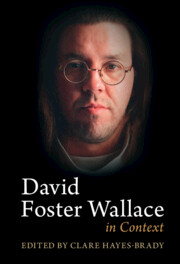Book contents
- David Foster Wallace in Context
- David Foster Wallace in Context
- Copyright page
- Contents
- Figures
- Contributors
- Acknowledgments
- Abbreviations
- Introduction
- Part I Contexts
- Part II Ideas
- Part III Bodies
- Part IV Systems
- Chapter 26 Infinite Jest as Opiate Fiction
- Chapter 27 David Foster Wallace and Racial Capitalism
- Chapter 28 Language and Self-Creation
- Chapter 29 Very Old Land
- Chapter 30 David Foster Wallace’s Ecologies
- Chapter 31 “I Could, If You’d Let Me, Talk and Talk”
- Chapter 32 David and Dutch
- Chapter 33 David Foster Wallace and Publishing
- Chapter 34 Author Here, There and Everywhere
- Works by David Foster Wallace
- Bibliography of Secondary Sources
- Index
Chapter 31 - “I Could, If You’d Let Me, Talk and Talk”
Institutions, Dialogue and Citizenship in David Foster Wallace
from Part IV - Systems
Published online by Cambridge University Press: 18 November 2022
- David Foster Wallace in Context
- David Foster Wallace in Context
- Copyright page
- Contents
- Figures
- Contributors
- Acknowledgments
- Abbreviations
- Introduction
- Part I Contexts
- Part II Ideas
- Part III Bodies
- Part IV Systems
- Chapter 26 Infinite Jest as Opiate Fiction
- Chapter 27 David Foster Wallace and Racial Capitalism
- Chapter 28 Language and Self-Creation
- Chapter 29 Very Old Land
- Chapter 30 David Foster Wallace’s Ecologies
- Chapter 31 “I Could, If You’d Let Me, Talk and Talk”
- Chapter 32 David and Dutch
- Chapter 33 David Foster Wallace and Publishing
- Chapter 34 Author Here, There and Everywhere
- Works by David Foster Wallace
- Bibliography of Secondary Sources
- Index
Summary
Wallace’s interest in the metanarrative systems that guide and govern human behavior persisted throughout his career, from urban geography, pharmacology and language through entertainment, taxation and alienation. One such system is that of citizenship, which arguably grows in significance the later we look in Wallace’s writing, reaching its zenith in The Pale King. This chapter outlines the configuration and operation of citizenship throughout Wallace’s work, situating it against a critical backdrop of studies of American space and citizenship more generally and working in dialogue with the accompanying chapters on ecologies, geographies and politics. A decisively American writer, Wallace’s writing deploys a complex set of images associated with citizenship and civic duty. Examining the shifting, almost hallucinatory qualities of nation space at play in Wallace’s late capitalist cultural imaginary, this chapter argues that Wallace’s image of citizenship emerges from a concept of community – individually and locally constructed by means of engagement with civic systems – rather than nationalist or historicist in nature.
- Type
- Chapter
- Information
- David Foster Wallace in Context , pp. 335 - 345Publisher: Cambridge University PressPrint publication year: 2022

